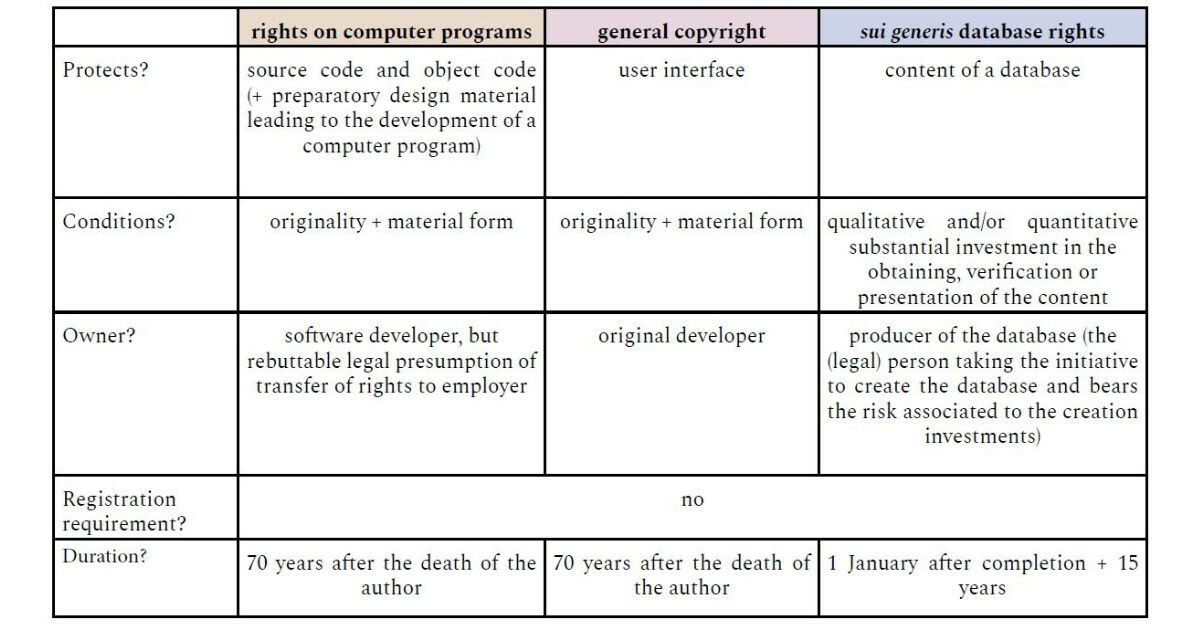I. Can the AI generated content be protected by IP rights and who can claim ownership?
AI systems can generate a variety of works that are, in theory, eligible for protection by IP rights, such as texts (copyright), images (copyright, design rights or trade mark rights), software codes (copyright on computer programs), etc.
But who can claim ownership of such IP rights? Four possible owners can be identified:
AI system: AI systems cannot claim IP protection on the AI generated content, as they do not have the legal personality to own (intangible) property IP rights. IP rights are thus in principle only attributable to natural and legal persons.
User: Whether or not the user can claim IP rights on the AI generated content among others depends on the creative process expressed by the user. For example, if the user does not modify AI generated content with its own creative and free choices, it is difficult to argue creation and ownership of copyright. Irrespective of the choices made by the user, the user could file the AI generated content as a trade mark, design or patent. In either case, attention must be paid to the AI systems’ disclaimer that AI generated content may not be “unique”, possibly triggering registration refusals, IP infringement claims (see question 2) and IP ownership discussions.
Provider of the AI system: The same principles as the user apply to the provider of the AI system. To avoid any discussions with the user as to IP (right) ownership, OpenAI for example transfers to the user all rights, title and interest, if any, in the AI generated content.
Owner original data: see question 2.
II. Does my company risk IP infringement claims when using AI generated content?
AI systems are trained to learn data patterns by means of combining a large amount of data with intelligent algorithms. The data used by AI systems may be protected by IP rights or other rights, e.g. copyright, portrait rights, etc. AI systems sometimes generate content that is similar or identical to IP protected material or sometimes create a derivative work.
The owner of the IP protected material that is copied, modified or processed in a derivative work can in principle act against the creation of such similar or identical works or derivative works based on its IP rights. Using AI generated content therefore entails a risk to IP infringement claims, as well as other types of claims (e.g. claims based on portrait rights).
A company using AI generated content could invoke different arguments in an attempt to circumvent an IP infringement. By way of example and if applicable:
validity arguments (the legal conditions for protection are not met);
exceptions, such as the exception for mere internal use (copyright); or
the lack of use in the course of trade in relation to goods or services, which is required to enforce the 3 EU trade mark rights and 3 out of 4 Benelux trade mark rights (trade mark).
Furthermore, a company can rebut a copyright claim by arguing that its work concerns an independent creation. To apply this rebuttal, the company should substantiate the lack of knowledge of the invoked IP protected material and/or an independent creation process. Taking into account the nature of the creation process (by means of an AI system) and the lack of transparency regarding the data used to train the AI system, the question however arises whether and how this rebuttal can be applied in relation to AI generated content.
III. Can AI systems help in terms of IP protection, enforcement or defence?
AI systems can provide useful assistance in terms of IP protection, enforcement or defence. For example, AI systems could assist in understanding a patent claim, tracing IP infringers and existing or similar works in the field of copyright, the state of the art in the field of patent law or existing designs with the same overall impression.
Companies should however be cautious when using AI systems for IP protection purposes. In particular when dealing with confidential or sensitive information, a company must bear in mind that AI systems use input to feed its systems and to generate new output. In a worst-case scenario, using AI systems to generate patent claim language, could for example result in a lack/loss of patent rights due to the lack of novelty. Furthermore, AI generated content may relate to different legal jurisdictions or be irrelevant.
Iv. Can AI software be protected by IP rights?
In theory, AI software can be protected by means of the specific protection of computer programs under copyright law and general copyright law. Furthermore, the content used by the AI software can be protected by the sui generis database right. The main principles of these IP rights can be summarised as follows:

Although more controversial (as computer programs as such are excluded from patent protection), AI software showing a technical contribution (so-called computer-implemented inventions) can be protected by patent law as well, subject to meeting the requirements of novelty, the inventive step and the industrial application.
***
Of course, the entire, more nuanced answers to the above questions depend on the specificities of each case. Furthermore, the legal landscape is still in its early stages and lacks clear-cut answers.
We are more than happy to assist you in answering your specific questions. Please do not hesitate to reach out to one of the members of the IP/IT/ data protection team of Liedekerke on their individual e-mail address or via ip-team@liedekerke.com.
